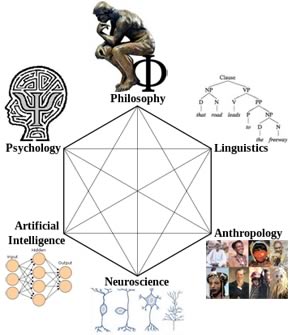
Assessing intelligence and behavior focuses on how information is represented, processed, & transformed using mental faculties such as perception, language, memory, reasoning, and emotion.

Cognitive Science: The word "cognitive" refers to capabilities of the mind including thinking, reasoning and remembering. While working as a scientist for Natural Selection for the last decade, my primary focus was on Artificial Intelligence (AI). The Cognitive Sciences (see Wiki) include several sub-categories (see diagram at right) which overlap several other sciences. Developing affective AI requires a certain level of understanding of these disciplines. In traditional AI, developing an "Expert System" was very programmer time-intensive and the best that a human expert could do. An example would be: "If function is true, do action, else do a different action" and this type of programming can result in hundreds of thousands of lines of code and a tangled mess of programming and months of testing. I discovered that it is best to set-up a simulation of Non-Player Character (NPCs) each with a set of parameters that emulate a range of cognitive (thinking) abilities and physical abilities and then set up a system of scoring how one NPC performs compared to the next. I then applied artificial object Neural Networks (NN) and dynamic adaptive learning capabilities of Evolutionary Computation (EC) to many of the projects and these methods produced the most effective results.
My Philosophy towards understanding cognition (thinking) ability is that the human brain is an amazing "relationship engine" which means that whatever we experience (or are currently thinking about), the brain is constantly working on making internal connections (using neurons) to prior stored connections based-on "weighted" similarities to such data. To clarify, let's say you see a dog of a mixed breed: your brain attempts to figure out what combinations of breeds the dog is made out of by comparing relative similar relationships (size, color, shape) to your prior experience (knowledge) of dog breeds. Much of our thinking and reasoning is based on prior experience, thus comparing such new data to stored knowledge. Of course, it is more complicated than that. Another example would be how we perceive art, such as music, in which our brain may make relationships based on how pleasing it is which may also be related to how well we can accurately store the experience. Popular music is enjoyed by the masses which receive positive stimulation from listening to the music that they have heard before, being familiar patterns in their brains. The brain positively reinforces recognition with dopamine, a good feeling that follows each note or pattern that the brain can correctly recognize, predict, or properly store for later recall. See "Artificial Intelligence"->Advanced AI Project for more details on my approach on how to give a computer the reasoning capabilities, and even artistic capabilities similar to the human brain.
My Philosophy towards understanding cognition (thinking) ability is that the human brain is an amazing "relationship engine" which means that whatever we experience (or are currently thinking about), the brain is constantly working on making internal connections (using neurons) to prior stored connections based-on "weighted" similarities to such data. To clarify, let's say you see a dog of a mixed breed: your brain attempts to figure out what combinations of breeds the dog is made out of by comparing relative similar relationships (size, color, shape) to your prior experience (knowledge) of dog breeds. Much of our thinking and reasoning is based on prior experience, thus comparing such new data to stored knowledge. Of course, it is more complicated than that. Another example would be how we perceive art, such as music, in which our brain may make relationships based on how pleasing it is which may also be related to how well we can accurately store the experience. Popular music is enjoyed by the masses which receive positive stimulation from listening to the music that they have heard before, being familiar patterns in their brains. The brain positively reinforces recognition with dopamine, a good feeling that follows each note or pattern that the brain can correctly recognize, predict, or properly store for later recall. See "Artificial Intelligence"->Advanced AI Project for more details on my approach on how to give a computer the reasoning capabilities, and even artistic capabilities similar to the human brain.